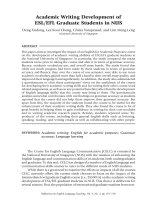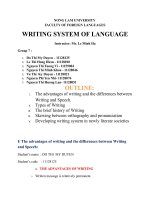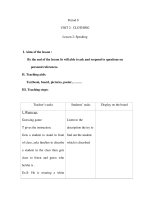Collocations for IELTS speaking writing
Bạn đang xem bản rút gọn của tài liệu. Xem và tải ngay bản đầy đủ của tài liệu tại đây (172.55 KB, 7 trang )
265 Collocations - Chìa khóa nâng điểm cho IELTS Speaking and Writing
Verb collocations
have
have a bath
have a drink
have a good time
have a haircut
have a holiday
have a problem
have a relationship
have a rest
have lunch
have sympathy
take
take a break
take a chance
take a look
take a rest
take a seat
take a taxi
take an exam
take notes
take someone's place
take someone's temperature
pay
pay a fine
pay attention
pay by credit card
pay cash
pay interest
pay someone a compliment
do
do business
do nothing
do someone a favour
do the cooking
do the housework
do the shopping
do the washing up
do your best
do your hair
do your homework
break
break a habit
break a leg
break a promise
break a record
break a window
break someone's heart
break the ice
break the law
break the news to someone
break the rules
save
save electricity
save energy
save money
save one's strength
save someone a seat
save someone's life
make
make a difference
make a mess
make a mistake
make a noise
make an effort
make furniture
make money
make progress
make room
make trouble
catch
catch a ball
catch a bus
catch a chill
catch a cold
catch a thief
catch fire
catch sight of
catch someone's attention
catch someone's eye
catch the flu
keep
keep a diary
keep a promise
keep a secret
keep an appointment
keep calm
keep control
pay someone a visit
pay the bill
pay the price
pay your respects
come
come close
come complete with
come direct
come early
come first
come into view
come last
come late
come on time come prepared
come right back
come second
come to a compromise
come to a decision
come to an agreement
come to an end
come to a standstill
come to terms with
come to a total of
come under attack
save something to a disk
save space
save time
save yourself the trouble
go
go abroad
go astray
go bad
go bald
go bankrupt
go blind
go crazy
go dark
go deaf
go fishing
go mad
go missing
go on foot
go online
go out of business
go overseas
go quiet
go sailing
go to war
go yellow
keep in touch
keep quiet
keep someone's place
keep the change
get
get a job
get a shock
get angry
get divorced
get drunk
get frightened
get home
get lost
get married
get nowhere
get permission
get pregnant
get ready
get started
get the impression
get the message
get the sack
get upset
get wet
get worried
Miscellaneous collocations
Time
bang on time
dead on time
early 12th century
free time
from dawn till dusk
great deal of time
Business English
annual turnover
bear in mind
break off negotiations
cease trading chair
a meeting close
a deal close a meeting
Classifiers
a ball of string
a bar of chocolate
a bottle of water
a bunch of carrots
a cube of sugar
a pack of cards
late 20th century
make time for next few days
past few weeks
right on time
run out of time
save time
spare time
spend some time
take your time
tell someone the time
time goes by
time passes
waste time
come to the point
dismiss an offer
draw a conclusion
draw your attention to
launch a new product
lay off staff
go bankrupt
go into partnership
make a loss
make a profit
market forces
sales figures
take on staff
a pad of paper
Collocations With The Words Big, Great, Large, Deep, Strong, And Heavy English
Collocations With The Word BIG
The word BIG is often used in collocations with a happening or event, for example:
● a big accomplishment
● a big decision
● a big disappointment
● a big failure
● a big improvement
● a big mistake
● a big surprise
English Collocations With The Word GREAT
The word great is often used in collocations with feelings or qualities.
Great + feelings
● great admiration
● great anger
● great enjoyment
● great excitement
● great fun
● great happiness
● great joy
Great + qualities
● in great detail
●
●
●
●
●
●
●
●
great power
great pride
great sensitivity
great skill
great strength
great understanding
great wisdom
great wealth
English Collocations With The Word LARGE
The word large is often used in collocations involving numbers and measurements.
● a large amount
● a large collection
● a large number (of)
● a large population
● a large proportion
● a large quantity
● a large scale
English Collocations With The Word STRONG
The word strong is often used in collocations with facts and opinions:
Strong + facts/opinions
● strong argument
● strong emphasis
● strong evidence
● a strong contrast
● a strong commitment
● strong criticism
● strong denial
● a strong feeling
● a strong opinion (about something)
● strong resistance
Strong + senses
● a strong smell
● a strong taste
English Collocations With The Word DEEP
The word deep is used for some strong feelings:
● deep depression
● deep devotion
It is also used in these expressions:
● in deep thought
● in deep trouble
● in a deep sleep (when the person won’t wake up easily)
English Collocations With The Word HEAVY
Heavy is used for some weather conditions…
● heavy rain
● heavy snow
● heavy fog
The word heavy is also used for people with bad habits:
● a heavy drinker
● a heavy smoker
● a heavy drug user
There’s also the expression “a heavy sleeper” – that’s not someone who sleeps a lot; instead,
it’s a person who doesn’t wake up easily when sleeping.
The word heavy is also used in collocations with two unpleasant things: TRAFFIC and
TAXES!
● heavy traffic
● heavy taxes
16 Common English Collocations With The Word TIME
Spend Time
To pass your time doing some activity.
Eg: I spend a lot of time studying English.
Waste Time
Doing something that is not a good use of time.
Eg: Stop w
asting time p laying computer games and get to work!
Make Time
For To “create” time in a busy schedule.
Eg: I need to make time for regular exercise – maybe I can go to the gym before
work.
Save Time
Something that is efficient and gives you extra time
Eg: Shopping online s aves me time because I don’t have to wait in line at the store.
Free/Spare Time
Time in which you have no obligations, and you can do whatever you want.
Eg: In my free time, I enjoy reading, painting, and cooking.
Have Time
Be available to do something.
Eg: I’d like to take violin lessons, but I don’t h
ave enough time.
Kill Time / Pass The Time
Do something to make the time pass faster while you’re waiting for something else.
Eg: Let’s bring some magazines to help pass the time o n the train ride.
Take Your Time
You can use as much time as you want, you don’t have to go fast.
Eg: “I like all of these computers. I’m not sure which one I want to buy yet.”
“That’s OK – take your time. ”
On Time
On schedule, at the right time.
Eg: It’s important to arrive o n time for a job interview.
Just In Time
At the perfect time, soon before something else happens
Eg: Hi, Henry! Have a seat – you got here just in time for dinner.
Have A Hard/Rough Time
Something difficult, or a difficult period in life.
Eg: I’m having a hard time solving this math problem. Could you help me?
It’s About Time
An expression that means “Finally!”
Eg: I t’s about time t hey fixed the air conditioner in my classroom! It’s been broken
for three years!
Pressed For Time
In a rush, in a hurry (when you need to do something and you don’t have enough time)
Eg: Sorry, I can’t talk at the moment – I’m a bit pressed for time. Can I call you back
later?
Run Out Of Time
Have no more time before the limit.
Eg: I r an out of time before I finished the test, so I didn’t answer the last five
questions.
Stall For Time
Delay.
Eg: My son didn’t want to go to bed, so he tried to stall for time by asking me to read
him another bedtime story.
Take Time Off
Not go to work.
Eg: I’m taking some time off in July to go camping with my family.









